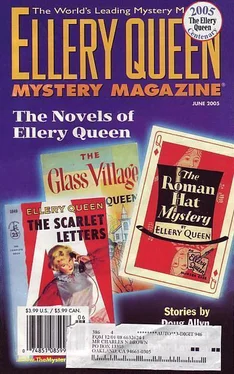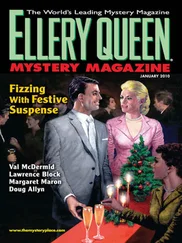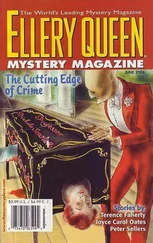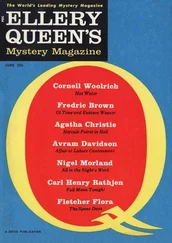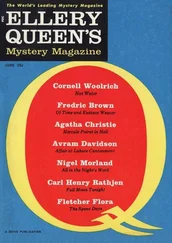Doug Allyn - Ellery Queen’s Mystery Magazine. Vol. 125, No. 6. Whole No. 766, June 2005
Здесь есть возможность читать онлайн «Doug Allyn - Ellery Queen’s Mystery Magazine. Vol. 125, No. 6. Whole No. 766, June 2005» весь текст электронной книги совершенно бесплатно (целиком полную версию без сокращений). В некоторых случаях можно слушать аудио, скачать через торрент в формате fb2 и присутствует краткое содержание. Город: New York, Год выпуска: 2005, ISBN: 2005, Издательство: Dell Magazines, Жанр: Детектив, на английском языке. Описание произведения, (предисловие) а так же отзывы посетителей доступны на портале библиотеки ЛибКат.
- Название:Ellery Queen’s Mystery Magazine. Vol. 125, No. 6. Whole No. 766, June 2005
- Автор:
- Издательство:Dell Magazines
- Жанр:
- Год:2005
- Город:New York
- ISBN:ISSN 1054-8122
- Рейтинг книги:3 / 5. Голосов: 1
-
Избранное:Добавить в избранное
- Отзывы:
-
Ваша оценка:
- 60
- 1
- 2
- 3
- 4
- 5
Ellery Queen’s Mystery Magazine. Vol. 125, No. 6. Whole No. 766, June 2005: краткое содержание, описание и аннотация
Предлагаем к чтению аннотацию, описание, краткое содержание или предисловие (зависит от того, что написал сам автор книги «Ellery Queen’s Mystery Magazine. Vol. 125, No. 6. Whole No. 766, June 2005»). Если вы не нашли необходимую информацию о книге — напишите в комментариях, мы постараемся отыскать её.
Ellery Queen’s Mystery Magazine. Vol. 125, No. 6. Whole No. 766, June 2005 — читать онлайн бесплатно полную книгу (весь текст) целиком
Ниже представлен текст книги, разбитый по страницам. Система сохранения места последней прочитанной страницы, позволяет с удобством читать онлайн бесплатно книгу «Ellery Queen’s Mystery Magazine. Vol. 125, No. 6. Whole No. 766, June 2005», без необходимости каждый раз заново искать на чём Вы остановились. Поставьте закладку, и сможете в любой момент перейти на страницу, на которой закончили чтение.
Интервал:
Закладка:
Kachani continued as though he hadn’t heard. “You said you were mopping upstairs when you heard the gunshot and you ran downstairs immediately. Why, in your extreme hurry, did you carry the bucket and mop with you? There is no way you could roll the bucket down the stairs anyway. You must have used the elevator.”
Ntaso opened his mouth, and then hesitated. He turned to his son. “Go play back there,” he said, and the little boy ran out onto the balcony.
When the boy was gone, Kachani added, “The gun Ebeso was killed with was gold-plated. I didn’t get to examine it, but I’d be willing to bet it had lions engraved on its barrel. You killed him.”
“No, no, no,” Ntaso replied, shaking his head vigorously. “I didn’t kill him.” He paused and considered whether or not to continue. Finally, he shrugged and sat back down on the sofa. “I found Ebeso in his study. I thought he was asleep, but when I came closer I realized he was dead. He had died naturally. Like that, so easily, after all the people he had killed.” He pointed at a framed picture on the wall in which he was standing next to a woman. “Miriam died in prison for encouraging her students at the high school to commit treasonous acts. All she did was help some students write letters to Amnesty International, and for that she died alone after God only knows what had been done to her. And Ebeso died peacefully in his sleep. I was so angry. At least if he had been killed by a rival or suffered in some way it would have been bearable. Standing there, I got the idea of how to humiliate him. I could make sure I was the only one who ever knew how he had died. I loaded him onto the bucket and wheeled him to the elevator. I took him down to the toilet and—”
“Shot him in the chest with his own gun,” Kachani finished. “Why didn’t you just come forward and say you had killed him?”
“Who would believe that I, a cleaner, had killed him? They would ask too many questions and maybe find out how he had really died.”
“But now the archbishop is taking the credit.”
“I’m the one who told him where the gun was.”
“What?!”
“When I found out he was claiming to have killed Ebeso I realised he would make it perfect. If people thought Ebeso had been killed by a man of God, the message would be clear.”
Kachani could not find anything to say in response. He had totally misjudged Arthur Ntaso. “Don’t you wish people could know what you did?”
“A bit,” admitted the cleaner. “But this is the best way, and if I ever feel bad, I have these.” He reached under his shirt and pulled out a selection of gold and silver stars. They were the medals for valor Ebeso had awarded himself. “I took them from his body. I’ll give you one if you keep quiet about what I did.”
“No need,” replied Kachani. “You deserve them.”
“Well then, maybe I can ask you to stay and eat with us. We are about to have dinner.”
“Thank you,” Kachani said.
Sometime later, Kachani was sitting at the dinner table with Arthur and his son Bidwe. Dinner was just cobs of maize and boiled cabbage. Not much of a meal, but Kachani looked at Bidwe. The boy had plump cheeks and a strong body. His clothes were faded to the point that Kachani couldn’t make out the words printed on his shirt, but they were clean and ironed. Arthur clearly did what he could to be a good father. Kachani’s eyes were drawn to the photograph Ntaso had pointed to earlier. How many other families were incomplete because of Ebeso? But then Kachani remembered the portraits of Ebeso in his palace. And of all the other portraits Ebeso had insisted grace the walls of every bank, school, and store in Malawi. In a few days they would all be torn down, defaced, and burnt. In a few years, none of those portraits would be remembered, but no one would ever forget the image of Ebeso’s corpse on the toilet.
“Thank you,” Kachani said to Arthur, taking a bite out of a cob. He could not remember maize tasting quite as good as it did at that moment.
Copyright © 2005 by Daliso Chaponda.
Vampire
by Joseph Monninger
A mystery novelist, memoirist, and professor of English, New Hampshire’s Joseph Monninger occasionally pens an offbeat short story as well; we’ve published three of his tales prior to this one. His memoirs Home Waters and A Barn in New England: Making a Home on Three Acres have both been highly praised. He is currently on sabbatical from Plymouth State University; we hope he’s using the time to write more in our genre.
The vampire’s house stood on a small knob of New Hampshire granite. Pine bushes pressed against the house and ate the paint. The bushes needed clipping and the house needed scraping. The house also needed a pound or two of nails to hang the shutters back in place, to put the soffits right, to hang the numbers of the address over the front door again. The steps to the front porch had cracked. Frost had found the cracks and widened them. A drainpipe on the south side of the house had come free and dangled against the clapboards, bumping in the afternoon breeze. The empty pipe matched the beat of a tire swing, hung from an oak branch that swayed enough to twist the support chain. November had stripped the oak and a scarecrow’s worth of leaves had collected in the belly of the tire. The rest had made a leafy mat along the front weed patch.
Vampires aren’t much on home maintenance, I thought.
A Goth girl answered the door when I knocked. She looked to be twenty-five. She liked black. She wore three studs in her nose, ten in her ears, one in her bellybutton, five in her eyebrows. She probably had more you couldn’t see. She made you want to grab a kitchen magnet and plunk it on her. She had been pretty once, but now she wasn’t.
“What?” she asked.
“I’m Detective Poulchuk,” I said. “Does Alan Pemi live here?”
“Why should I tell you?”
“Why not?”
“You’re a cop,” she said. “Cops suck.”
“Right,” I said.
“Don’t you need a warrant or something?”
“I’m not here to search anything. Just want to talk to Mr. Pemi.”
“He doesn’t talk to people until sunset.”
“Because he’s a vampire?”
She shrugged.
“But you’re not a vampire,” I said.
She shrugged.
“You must be in training,” I said.
“Shove it.”
She closed the door.
I drove over to Java the Hut’s, bought two coffees, then drove to Wentworth Park and pulled up next to the statue of a Boy Scout. The Boy Scout posed on one knee, his hands stretched out to give drinks to passing animals. During the summer, water dripped out of his hands into a drinking bowl for dogs. Now, without the trickle of water, the Boy Scout looked like a kid asking for a handout. Not the intended effect.
Wally Hoyle, my deputy, slid into the passenger seat.
“You don’t think it’s cold,” he said, “and then it is.”
“November in New Hampshire,” I said.
“Tell that to the freaking kids,” he said.
He pushed his chin at the usual collection of kids, early high-schoolers, pre-drivers. Girls and boys. They smoked cigarettes and played Hacky Sack and sometimes did drugs. They asked older kids to pick them up a six-pack or two. They didn’t do much that other kids didn’t do, except that they did it in the center of town with the municipal bandstand as their headquarters. Today, from what I could see, they seemed determined to kick their skateboards into the air and slide on them along a sidewalk railing. Nothing new there, either.
“Coffee for me?” Wally asked.
I nodded. I stirred my coffee with a wooden stirrer. Wally took a sip of his. He hardly looked much older than the kids collected around the bandstand. He wore a red mackinaw and musher’s fur cap. His pistol formed a small bulge under his jacket, but you wouldn’t notice it if you didn’t look for it.
Читать дальшеИнтервал:
Закладка:
Похожие книги на «Ellery Queen’s Mystery Magazine. Vol. 125, No. 6. Whole No. 766, June 2005»
Представляем Вашему вниманию похожие книги на «Ellery Queen’s Mystery Magazine. Vol. 125, No. 6. Whole No. 766, June 2005» списком для выбора. Мы отобрали схожую по названию и смыслу литературу в надежде предоставить читателям больше вариантов отыскать новые, интересные, ещё непрочитанные произведения.
Обсуждение, отзывы о книге «Ellery Queen’s Mystery Magazine. Vol. 125, No. 6. Whole No. 766, June 2005» и просто собственные мнения читателей. Оставьте ваши комментарии, напишите, что Вы думаете о произведении, его смысле или главных героях. Укажите что конкретно понравилось, а что нет, и почему Вы так считаете.
